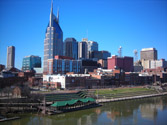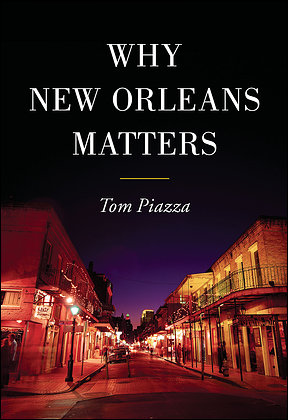















Southern Press
A Review of
Why New Orleans Matters
(Tom Piazza; New York: ReganBooks, 2005.)
Why New Orleans Matters
(Tom Piazza; New York: ReganBooks, 2005.)
Author of the critically acclaimed novel My Cold War and recipient of a prestigious Grammy award for his album notes to Martin Scorcese Presents the Blues: A Musical Journey, Tom Piazza emphatically and ardently makes a compelling case for rebuilding and preserving the city he has called home for over a decade in his latest book, Why New Orleans Matters.
Though more than a year has passed since New Orleans and the Gulf Coast felt the onslaught of Hurricanes Katrina and Rita, Why New Orleans Matters still has considerable relevance and merits reading. Piazza asks, "Every place has its history, but what is it about New Orleans that makes it more than just the sum of the events that have happened there? What gives it a meaning and a soul so that it is known throughout the world as a place to visit to revive the spirit? What is it about the spirit of the people who live there that could produce a music, a cuisine, an architecture, a total environment, the mere mention of which can bring a smile to the face of someone who has never even set foot there?"
Though more than a year has passed since New Orleans and the Gulf Coast felt the onslaught of Hurricanes Katrina and Rita, Why New Orleans Matters still has considerable relevance and merits reading. Piazza asks, "Every place has its history, but what is it about New Orleans that makes it more than just the sum of the events that have happened there? What gives it a meaning and a soul so that it is known throughout the world as a place to visit to revive the spirit? What is it about the spirit of the people who live there that could produce a music, a cuisine, an architecture, a total environment, the mere mention of which can bring a smile to the face of someone who has never even set foot there?"
Good questions. And Piazza's fluid elucidations render a picture of a city that possesses an inimitable, uniting spirit in spite of its multi-cultural make-up and the fact that its wealthiest and poorest inhabitants are socially and economically light years apart, but frequently reside within a block or two of each other. Neither using excessive hyberbole nor incorporating garish statements to describe New Orleans, Piazza (a New Yorker by birth, but hardly a displaced yankee) has obviously grasped the personality and intricasies of the Big Easy, enabling him to intimately write about the city as if he were a native son. He takes time to expound on his love for cochon de lait po' boys. He conveys the thrill one finds when R&B legend Fats Domino takes the stage at Jazz Fest. He relates the emotional experience of New Orleans funeral processions in which jazz bands progress "from dirge to celebratory stomps." And he assesses the heavy Crescent City air, likening the fragrance of Confederate jasmine or ligustrum to "an endless olfactory ambush in the evenings." But he makes no effort to sugarcoat the city's negative aspects---like its rampant crime or pervading corruption among its leaders and within its police department.

While Piazza describes New Orleans as a "city of elegance, beauty, refinement, and grace," he adds, "It is also a city of violence, poor education, and extreme poverty of a type that you can't imagine if you haven't actually seen it." He goes on to say, "Even in its most desperate precincts it is a city of deep and powerful humanity, of endurance, resilience, humor and affirmation in the face of adversity. Yet it may be worth stating what should be obvious: the good times, in New Orleans as elsewhere, ride on the ill-paid efforts of people who did not get certain breaks."
When the unstable levees yielded to the rising flood water, neighborhoods like the impoverished Lower Ninth Ward as well as affluent Lakeview were dramatically devastated, but the poorer folks lack the resources needed to rebuild and sufficiently regain some semblance of normalcy. With an impassioned style and conviction that rivals the delivery of a stirring Pentecostal Sunday morning sermon, Piazza interjects that the hard-working, underprivileged citizens of New Orleans don't deserve to be written off or overlooked as rebuilding strategies are contemplated and reconstruction gets underway. It was these folks---black, white and every race or ethnicity in between, though mostly black---who fared least successfully during the flooding and subsequent widespread destruction. Yet, ironically, their service positions and menial jobs arguably benefit wealthy New Orleanians and the city's vital tourist and convention industries the most. New Orleans' low-income workers are not only contributors to the local economy, but they are integral elements of the city's character and its cultural treasury. Piazza argues that ". . . any scenario of a rebuilt New Orleans that does not embrace the fact of their centrality to New Orleans, that does not find a way to welcome them back and make jobs and a new life for them, will be an obscenity."
"At one point, early on, some public figures even asked whether it 'made sense' to rebuild New Orleans," Piazza concedes, but he questions, "Would you let your own mother die because it didn't make financial sense to spend the money to treat her, or because you were too busy to spend the time to heal her sick spirit?"
As for the spirit of New Orleans to which Piazza so frequently refers, he states, "That spirit is in terrible jeopardy right now. If it dies, something precious and profound will go out of the world forever." May it never die. And may we always remember, as if reminded by the affirmation of a jazz funeral in which the mourning of a loss evolves into the celebration of life, that New Orleans can and will live again. After all, it . . . matters.
"At one point, early on, some public figures even asked whether it 'made sense' to rebuild New Orleans," Piazza concedes, but he questions, "Would you let your own mother die because it didn't make financial sense to spend the money to treat her, or because you were too busy to spend the time to heal her sick spirit?"
As for the spirit of New Orleans to which Piazza so frequently refers, he states, "That spirit is in terrible jeopardy right now. If it dies, something precious and profound will go out of the world forever." May it never die. And may we always remember, as if reminded by the affirmation of a jazz funeral in which the mourning of a loss evolves into the celebration of life, that New Orleans can and will live again. After all, it . . . matters.
Author: Greg Freeman. Published September 30, 2006.
Copyright
Southern Edition
All Rights Reserved
Southern Edition
All Rights Reserved
All materials contained on this site, including text and images, are protected by copyright laws and may not be reproduced without prior written permission from the publisher. Where applicable, use of some items contained on this site may require permission from other copyright owners.
Fair Use of text from SouthernEdition.com is permitted to the extent allowed by copyright law. Proper citation is requested. Please use this guide when citing a Southern Edition article.
Contact Greg Freeman or SouthernEdition.comFair Use of text from SouthernEdition.com is permitted to the extent allowed by copyright law. Proper citation is requested. Please use this guide when citing a Southern Edition article.